Grandmothers bear the brunt of Syrian orphan crisis
Publication: Al-Monitor
ZAATARI, Jordan — It has been years since Da’ed and her family fled Syria, but when her granddaughter asks where her mother and father are, the 60-year-old woman cannot find the right words to explain. In fact, Najoua, 4, still doesn’t know that her parents were killed by regime airstrikes in Daraa province two years ago. In total, 140 people were killed that day, including Najoua’s father and her pregnant mother.
For a brief second, Da’ed pauses, looks at her granddaughter and puts her hand on her chest. “My heart aches when I think of all the people I know who have died,” Da’ed says, pulling a handkerchief from her pocket. She wipes away a tear. Because they fled to Jordan almost immediately after the attack, she did not even have time to mourn her deceased daughter.
“I had to be strong for this little girl,” she says with a loud, sharp voice while lighting up a cigarette.
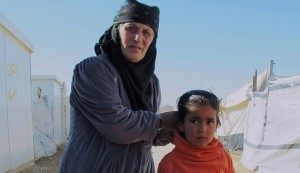
Suddenly, the steel door is slammed and pots and pans fall on the floor. Children run through the noisy trailer where Da’ed lives with Najoua and 15-year-old Yusuf, her mentally disabled son. Although two of her daughters and their children also live in the camp, it was an unspoken agreement that Da’ed would take care of her granddaughter after her parents died. But it certainly wasn’t easy in the beginning: The public toilets were filthy, the tent was either too cold or too hot and taking care of a toddler was very tough for a woman her age. Luckily, the United Nations High Commissioner for Refugees (UNHCR) gave her a trailer a few weeks ago.
For each member of the household, Da’ed receives 20 Jordanian dinar ($28) per month on her UN-issued debit card. This amount can be spent in the local supermarket to buy bread, milk and other groceries, but she still faces difficulties. “We never have enough money,” she says. “I wish I could give her anything in the world, because she deserves that.”
Currently, 83,856 refugees live in the Zaatari camp, which opened in July 2012 to shelter refugees fleeing the war in Syria. One out of five households are headed by women, the UNHCR reported. The vast majority of them are widows whose husbands were among the estimated 210,000 Syrians killed during the four-year civil war, or mothers whose husbands still fight the regime in Syria.
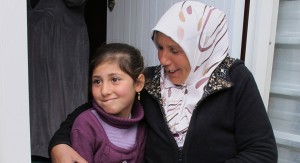
However, there are also grandmothers and aunts who raise their grandchildren, nieces and nephews. Faiza, 51, is one of them. For over two years she has taken care of her niece Haya, a cheerful 9-year-old with big brown eyes and brown hair. According to her aunt, Haya saw a rocket kill her mother in Syria. This must have left a huge scar, but the girl hardly talks about it.
“After the attack, her father — my brother — asked me to take her with me to Jordan. He is a fighter in the Free Syrian Army. Why did I say yes? Well, because I love her,” Faiza tells Al-Monitor. “My husband died a few years ago, and God did not give us any children of our own, so I am happy that I can raise her like she is my own child.”
Like Da’ed, Faiza explains that it is not easy to raise a child without a husband. Besides the fact that she doesn’t have enough money to buy clothes and food, she complains about the quality of education in the camp. Children sometimes attend classes with 130 other children.
“Sometimes they do not even hear what the teacher says! The level of education was much better in Syria,” she says, adding that she hopes that Haya will attend university in Jordan in the future, even though it is hard to predict whether they will still be living in Zaatari. “She really is a smart girl,” Faiza says.
When Faiza first arrived at the camp, she told herself that she would stay no longer than a few weeks, but the weeks turned into months and the months turned into years. Zaatari became their new home.
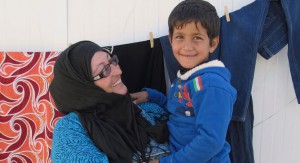
A few yards away, Mouna, 43, holds her grandson Mohammed, 6, in her arms in front of her trailer. The boy laughs. “I gave birth to two boys and four daughters, but I think I love my grandson more than them. He is so sweet, smart and cheerful. He really is my everything,” Mouna grins.
Her daughter married at age 14 and divorced her husband when she was pregnant with his child. After that, she remarried and moved to Damascus. Mohammed was not allowed to come with her because her new husband, a traditional man, didn’t want to raise someone else’s child. About 90% of the residents in Zaatari are from Daraa, a province known for its conservative and traditional Sunni population. In this province, it is common for girls to marry at a very young age.
That she takes care of her grandson has absolutely nothing to do with the war in Syria, Mouna says. Yet it is well known that the lack of space inside refugee homes can cause tensions around unemployment and money to rise within families. This happened with the parents of Hassan, 10, Mohammed, 12, and Hiba, 6, who were recently split up. Their mother now lives in Amman and their father went back to Syria to fight. The children now live with their grandmother Fatma, 80.
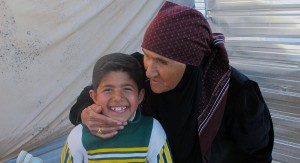
“Yes, it is difficult to take care of three children at this age — sleeping with them in the same trailer, washing their clothes and feeding them — but what else can I do? Their mother doesn’t even visit them and we cannot send them back to Syria,” Fatma says. “The war in Syria has split up a lot of families.”
Luckily, she has a large family support network in the camp. Her other son, his wife and their children live in the trailer next door. Together, they take care of the children.
Fatma sighs, “As long as we have each other, we will be fine.”
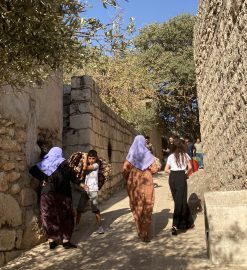
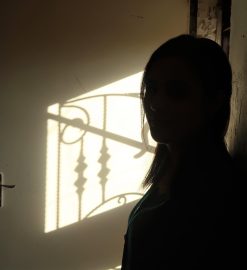
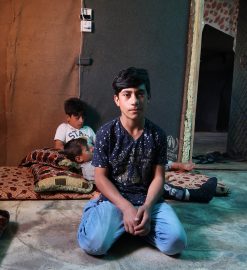
Leave a Reply